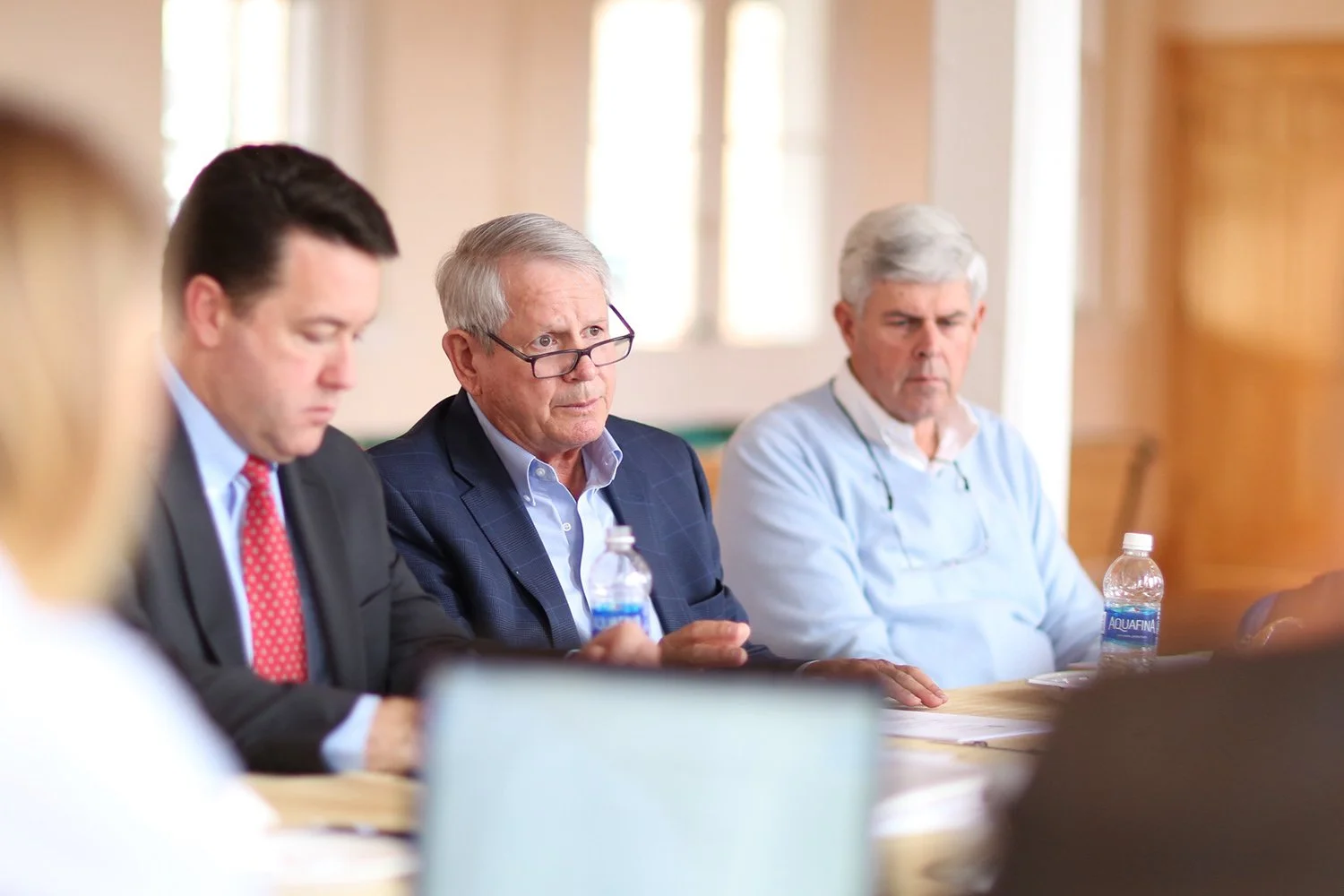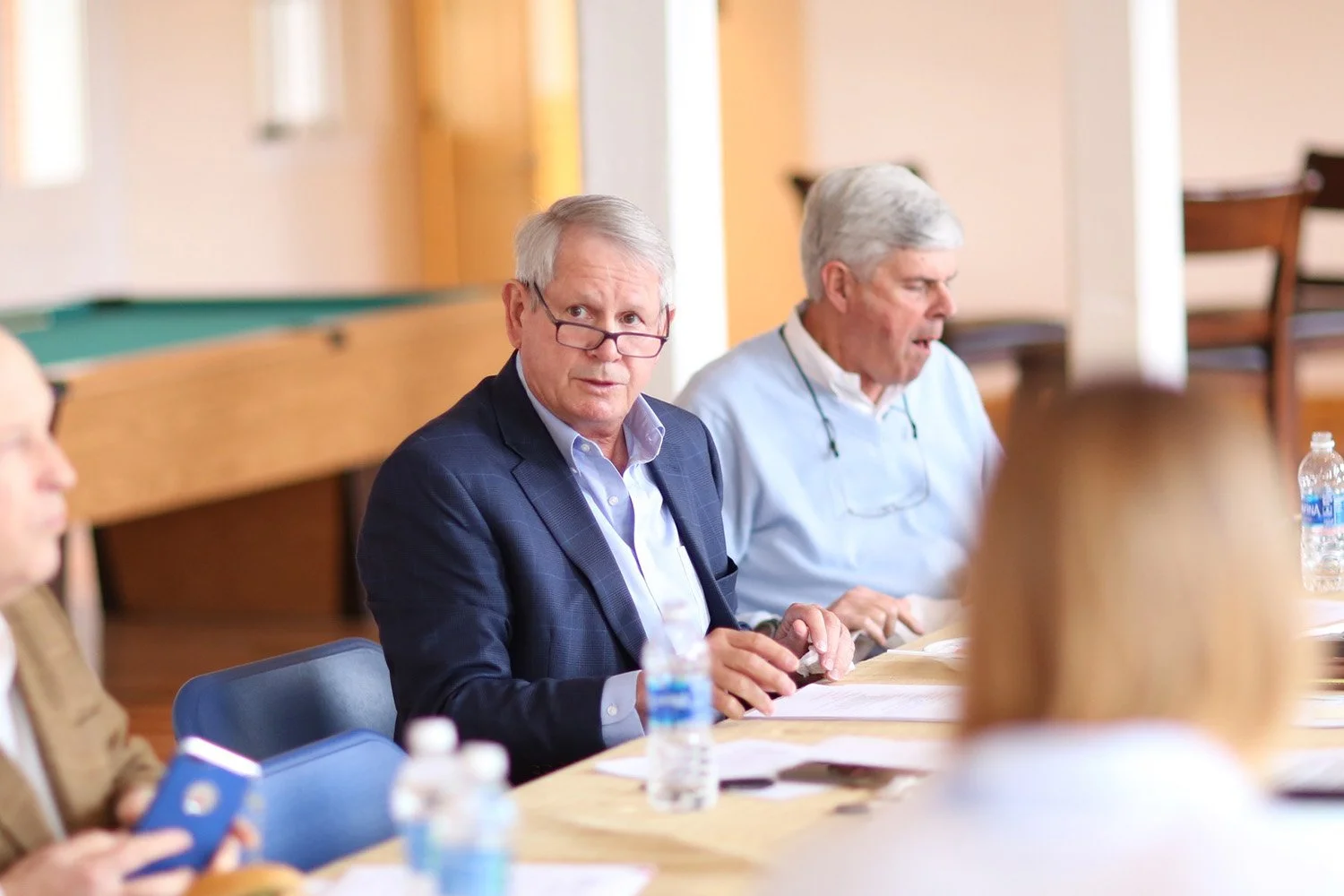Leadership, Purpose, and History
MSA has benefited from the leadership of Mark Krebs for nearly two decades. Mr. Krebs has served on the Board of Trustees since 2006 and served as the Chair of the Board since 2011. This past fall, he spoke to the students, faculty, and the board at the installation ceremony for our 14th Head of School, Michael Drude. His remarks get to the heart of Miller School of Albemarle’s history and purpose. Mr. Krebs highlights why MSA is MSA and how good leadership has ensured Samuel Miller’s dream has endured the test of time.
Purpose
Simon Sinck’s book Start with Why tells us that everything begins with getting the answer to “why.” In the book, The Purpose Driven Life, Rick Warren tells us that “goals are temporary, purpose is eternal.” So, when we review Samuel Miller’s will, we get a glimpse of his purpose. He envisioned a school “for worthy children who otherwise would be unable to secure a proper education, whose parents shall be unable to educate them.” In addition to providing an educational opportunity for these students, Miller further stipulated that they be fed, clothed and “were not to be required to work more than six house out of every 24 hours.” Today, our students labor not just on their studies, but in the community, where they volunteer every Wednesday for groups such as C’Ville Parks and Rec, …. Our students also work to maintain the miles of bike trails that they built on our 1,600 acres.
Miller School’s first superintendent, Charles Vawter, said in a 1889 speech that “in order to develop the boy into the perfect man, schools needed to train the head, the hands, and the heart.” He further stated that the failure to recognize the importance of “hands” in a school’s curriculum results in a society of individuals who “know, but cannot do.” The phrase--head, hands, heart--represents the essence of not only what we teach here at MSA but also why.
“The phrase—head, hands, heart—represents the essence of not only what we teach here at MSA but also why. We have always known that a school that educates its students in just one or two of these intrinsic elements delivers a student who is not fully prepared for life’s challenges.”
We have always known that a school that educates its students in just one or two of these intrinsic elements delivers a student who is not fully prepared for life’s challenges. And of these three, heart is the engine that powers us through life, and heart is defined as service to others, to our community, to our nation and to our fellow students.
History
Samuel Miller was born in 1792 to a poor, uneducated, unmarried woman by the name of Jane Miller right here in the area--between Batesville and North Garden. He was raised in a one-room, dirt-floor cabin. He had an older brother, John, and the family survived economically by the boys collecting wool left by passing sheep in local briar patches, which their mother then made into clothes and sold. Jane Miller valued education, to the point of following her sons to school, switch in hand, to assure their attendance.
As a young man, Samuel Miller moved to Lynchburg, VA and quickly became a successful speculator in English hemp and tobacco markets. He invested heavily in what was then emerging markets--Illinois, Indiana, and Missouri state bonds plus bond and railroad stocks located in the Midwest. He lived modestly during his lifetime, with only 1% of his entire net worth listed as personal property at his death. However, his obituary in March 1869 described him as the wealthiest man in Virginia.
While his formal education was limited, Miller was a voracious reader. His health failed him at the young age of 37, and for the next 39 years, he was virtually a recluse in his home outside Lynchburg. There is little doubt however that his intense desire to provide for the poor and homeless children of Central Virginia was based on his early childhood experience.
“Miller realized early on that even the brightest mind counted for very little without the will to labor.”
Miller realized early on that even the brightest mind counted for very little without the will to labor. Charles Vawter took his direction as to what would constitute a full school day from Miller’s will. It is why “hands” became a critical element of a student’s daily schedule, which in those days included classes from 8:00 AM to 12:15, lunch, then manual labor from 1:30PM to 4PM, free time to 6:00 PM, then dinner followed by study hall and bedtime at 10:00 PM.
Until the late 1950s, the students grew, cultivated, and harvested almost two-thirds of the food consumed at the school, selling excess produce from our gardens, orchards, and pastures to generate operating revenue for the school. In 1960, our fields and farmland were leased out to private businesses that provide reasonable revenue to the school even today.
Leadership
From the beginning, the Miller School of Albemarle has been blessed with extraordinary leadership. Architect Albert Lybrock designed and Thomas Woodroffe built a facility that according to the Richmond Dispatch in 1878 was “second only in importance to UVA.” Thomas Edison supplied two “K” dynamos and 400 light bulbs to provide electricity at the school, a scant three years after perfecting the electronic lighting system in 1877.
“From the beginning, the Miller School of Albemarle has been blessed with extraordinary leadership. ”
Since the beginning, the head of school has almost without exception been an exceptional teacher who provided crucial leadership and administration.
Over the years, each head of school has helped build a staff of skilled educators, selecting individuals who possessed great sensitivity and genuine interest in the students. These leaders helped the school weather the financial hard times that every boarding school encounters, including two world wars, floods, epidemics, and droughts, all of which beset MSA between 1918 and 1945. Most private schools do not survive for long periods of time. Of the 58 private schools founded in Charlottesville between 1803 and 1930, only 10 remained open for more than 10 years.
From the earliest days, faculty here “knew that teaching at MSA was both hard and interesting work (1928).” “Everyone has to be more than a teacher (1957).” “To teach at MSA, one accepts the responsibility to be a surrogate parent for those whose real parents are often far away (1965).”
Peggy Flannagan, widow of our 6th superintendent, Hugh Flannagan, worked at the school from 1922 until her death in her mid 90’s, said in 1995, “I love everything about this school. At 90, I have never been around old people. Can you imagine a fuller life than living with all these boys and girls?”
“I love everything about this school. At 90, I have never been around old people. Can you imagine a fuller life than living with all these boys and girls?”
So now we embark on a new journey with our 14th Head of School, Michael Drude. One of life’s most successful and enduring principles of leadership is seeking understanding before seeking to be understood. So what does that mean? It means beginning with a questioning process that is unbiased and non-judgemental. It means being an active listener, which includes “hearing” the non-verbal clues that represent at least 70% of the conversation. Successful leaders, like Mike, create a trusting environment where reluctant questions are always encouraged.
This was the model of instruction taught by Aristotle and Socrates; it encourages students to think and problem solve by asking their own questions--not simply responding to a question posed by the instructor.
“What you find here at MSA is an academic environment that teaches and reinforces personal integrity, humility, perseverance, and acceptance without bias.”
What you find here at MSA is an academic environment that teaches and reinforces personal integrity, humility, perseverance, and acceptance without bias. A life’s purpose of service to others, exhibited over time, creates a history and culture that, if reinforced by caring teachers and sensitive leadership will continue to create a legacy of graduating exceptional students who understand how to make the world a better place, who will have the perseverance to overcome the challenges that life presents and who understand that being successful is not defined by what you end up with--it is defined by who you become doing it.



